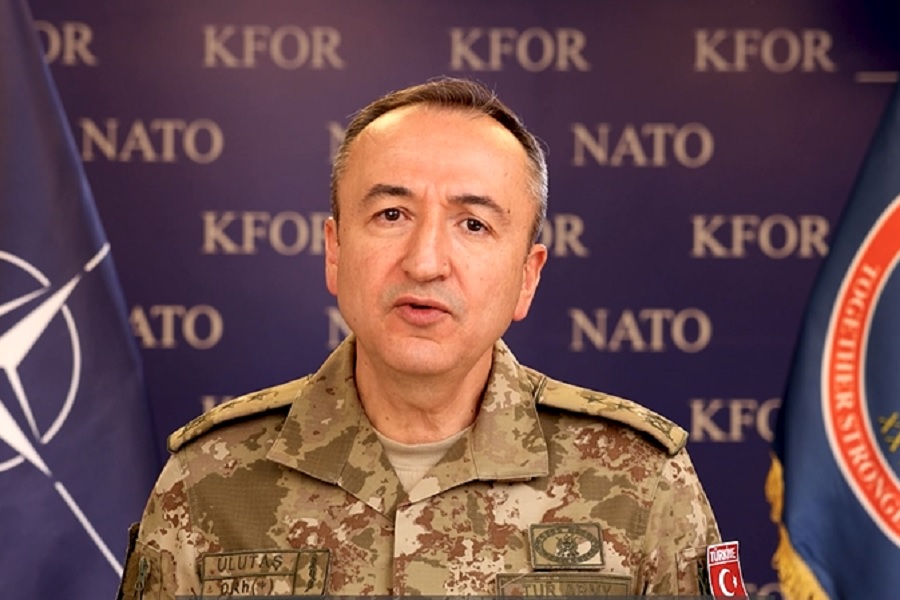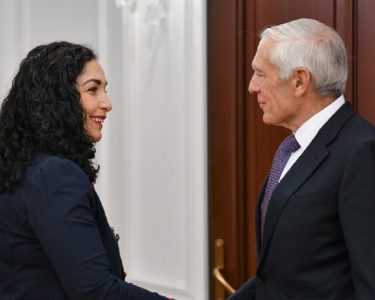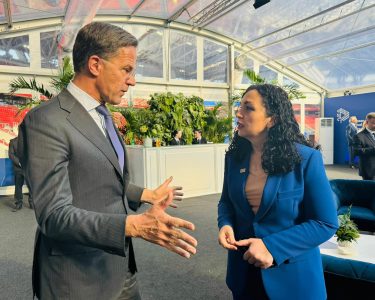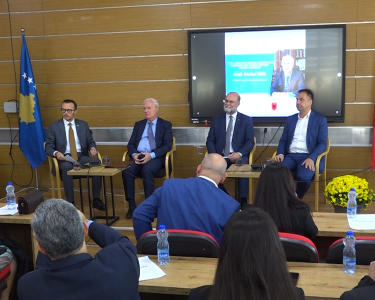KFOR is well resourced and postured to prevent escalation, and to address any security scenario, KFOR commander Ozkan Ulutas says in an interview for KosovaPress. He assesses that the security situation in Kosovo is calm, but fragile, while adding that KFOR continues to monitor with vigilance.
“Overall, the situation on the ground is calm, but it remains fragile. KFOR is monitoring the situation. It is vigilant and well postured to respond to any further relevant development, in accordance with its long-standing UN mandate to contribute to a safe and secure environment for all people and communities living in Kosovo and freedom of movement, at all times and impartially”, he underlines in the written interview for our agency.
At the end of his mandate, Ulutas also talks about the opening of the Iber Bridge, for which he says that KFOR has been transparent and consistent throughout, stressing that every decision must be made through dialogue with the international community. Expresses NATO’s readiness to maintain peace.
- KFOR continues to monitor the situation
“We are well postured to address any security scenario and to continue implementing effectively our UN mandate. We constantly monitor all relevant developments that may affect security across Kosovo and the region… KFOR is well resourced and postured to prevent escalation, and to address any security scenario, in accordance with our UN mandate”.
On the one-year anniversary of the terrorist attack in Banjska of Zveçan, where police sergeant Afrim Bunjaku was killed, the KFOR commander says that they expect the perpetrators to be held accountable.
“We have condemned the unacceptable violent attacks in Banjska and will continue to insist that the perpetrators be held accountable, and brought to justice”, said Ulutas.
Full interview:
How do you assess the security situation in Kosovo?
Overall, the situation on the ground is calm, but it remains fragile. KFOR is monitoring the situation. It is vigilant and well postured to respond to any further relevant development, in accordance with its long-standing UN mandate to contribute to a safe and secure environment for all people and communities living in Kosovo and freedom of movement, at all times and impartially.
KFOR continues to act as third security responder, in close coordination with the Kosovo Police and the EU Rule of Law (EULEX) mission, which are the first and second security responders, respectively.
I would like to add that throughout my tenure as KFOR Commander, I have clearly sensed a desire for lasting peace and security amongst all communities.
Why is KFOR against the opening of the Iber Bridge?
Based on the Brussels agreements, the bridge was expected to open in 2019, while the Kosova Police say that there is no indication of an increase in tensions in case of the opening of the Iber bridge?
What will be the position of KFOR if the Kosovo Police will ask to remove the troops over the Iber River? How is the current cooperation with the police in the north?
KFOR’s position about the Iber bridge has been transparent and consistent throughout, and it has been recently reiterated by the KFOR Spokesperson,
- The NATO-led KFOR mission is fully focused on the implementation of its UN mandate, based on United Nations Security Council Resolution 1244 of 1999.
- By contributing to a safe and secure environment for all people and communities living in Kosovo and to freedom of movement, at all times and impartially.
- On the issue of the potential opening of the Ibar river Bridge in Mitrovica to vehicles, our position has been transparent and consistent throughout.
- Any decision in this respect must be taken through dialogue and in timely and effective coordination with the International Community.
- In the meantime, KFOR will maintain its fixed presence on the bridge and will continue to conduct regular patrols in the surrounding areas.
- Recently, some training activities have been carried out by KFOR personnel on the bridge. These were part of our regular activities designed to test long-standing operational procedures and to safeguard the highest standard of readiness of our troops.
- KFOR continues to monitor the situation.
- We are well postured to address any security scenario and to continue implementing effectively our UN mandate.
How do you see the risk of a military attack from Serbia in Kosovo, when it is known that Serbia has put military forces on alert around the border?
Over the years, KFOR has developed good cooperation with the Serbian Armed Forces, as attested by KFOR’s observations of past exercises and regular contacts we have with our Serbian counterparts. I remain in close contact with the Serbian Chief of Defence, as well as with the Institutions and security organizations in Kosovo. Regular and transparent communications and interactions help to increase mutual situational awareness, avoid misunderstandings and contribute to regional stability.
We constantly monitor all relevant developments that may affect security across Kosovo and the region. KFOR is well resourced and postured to prevent escalation, and to address any security scenario, in accordance with our UN mandate.
There is still no responsibility for the terrorist attack in Banjska?
NATO and KFOR have been very clear on this point throughout. The facts must be established and we expect the perpetrators to be held accountable.
In the wake of last years’ violence, we have deployed around 1,000 additional peacekeepers and heavier equipment to Kosovo. We have increased KFOR’s posture in northern Kosovo, and tripled the number of patrols, including along the Administrative Boundary Line. They were prudent steps to ensure that KFOR has the forces, capabilities and flexibility to continue fulfilling its UN mandate effectively. This has been also the biggest reinforcement of our contingent in Kosovo in a decade; and it shows that NATO stands ready to preserve peace.
What is your opinion on the involvement of Serbia in the September 24 attack?
I will not venture into any speculations. We have condemned the unacceptable violent attacks in Banjska and will continue to insist that the perpetrators be held accountable, and brought to justice.
Has KFOR taken additional measures to increase the level of security in areas inhabited by Serbian majority in Kosovo?
Our current mission’s strength consists of around 4600 troops contributed by 29 contributing nations, including NATO Allies and partners. Such a robust and visible presence allows us to effectively monitor the situation and to take all necessary measures to continue fulfilling our UN mandate, across the whole Kosovo, at all times and impartially.








